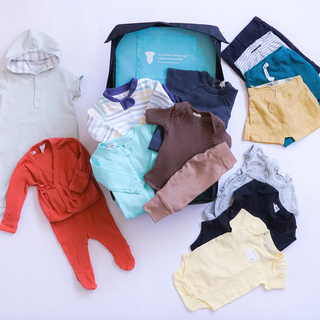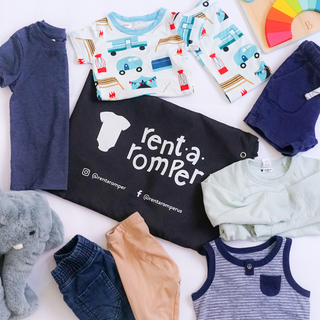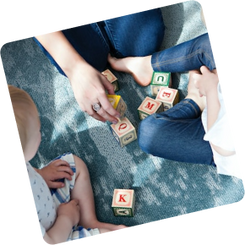baby registry
November 5, 2022
The Rules for Visiting Newborns Has Changed. Here’s What You Need to Know.
Written by mom and RAR member, Lauren Finney Harden.
So your friend or loved one just had a baby—how exciting! You might have already been thinking about holding the baby for the first time, or imagining what it would be like to smell that newborn smell. Before you start assuming anything to do with a newborn that is not your own, there are a few things to consider as far as newborn and new parent boundaries go. The pandemic has certainly changed official hospital protocol, but it’s also changed the way new parents feel about visitors in their homes. While everyone wants to see and love on a new baby, there are certain things that need to be done or explicitly said before you can visit.
Preparing for a Newborn Visit
The first thing to know about visiting a newborn is that it is by invitation only. Everyone’s postpartum experience is different, and some may struggle with postpartum anxiety or depression. The thought of visitors could be too overwhelming to them, or they may just want some space and privacy in which to get to know their new baby. Other new parents might have decided that visitors are off-limits until a certain age to help mitigate the spread of germs, COVID-19 or otherwise.
The most important thing about visiting a newborn is to respect the parents’ wishes, even if they differ from how you were raised or how you see the situation. When invited for a visit, assume the offer only extends to you or whomever else the new parent explicitly mentions may come; this often does not include children, especially if they are school-aged and exposed to germs frequently, so prepare accordingly.
Don’t overstay your welcome. Being “on” and entertaining guests after giving birth or bringing home a child can be difficult for some, and you’ll want to make sure you’re not taxing tired new parents by lingering too long. Even better, follow our “be helpful tip below” and provide support instead of burdening your host with extra things to do or prepare.
Visiting a Newborn
Once the visiting time has been established, it’s best to ask the new parent what their preferred protocol is. They might ask about your vaccine status (COVID-19, flu, and whooping cough are common concerns), or they might ask you to wear a mask to prevent the spread of germs. The point is, you’re entering a family’s safe space and you need to respect their rules and protocols and forgo your own if you wish to see the baby. It’s best to ask before you do anything, including holding the baby or posting to social media. Making absolutely no assumptions before visiting is key to having a good visit.
Be mindful of viruses and bacteria you could pass to baby. A few health housekeeping items: Wash your hands! At a minimum, you need to wash your hands before holding or touching any new baby (if the parents have offered to let you hold baby). Even better, wash your hands upon entering a new baby’s home so you don't transfer any bugs to their toys or their environment. If you're not in a space with a sink where you can wash your hands, use hand sanitizer instead (be sure to bring some to your visit). Also, when you enter a home with a new baby, remove or cover your shoes—even if you’re not asked to. Wearing a mask might help make the new parents more comfortable too.
And, most importantly, never kiss a newborn baby (we know it’s tempting!). Respiratory viruses like RSV can be easily transmitted through kissing and can be fatal in newborns.
Consider questions carefully. While it might seem innocuous to ask questions about schedules, feeding, or sleeping, do your best to frame questions in a loving and inquisitive manner, rather than one that might come off as judgmental. New parents are tired and extremely sensitive to this big life change, and something as innocent as asking if they’re getting enough sleep might be inappropriate. Questions that come off well include, “How can I help,” “Do you need anything?” or “Do you want to share or talk about your experience?” If they do want to talk, prepare to be a supportive listening ear and avoid giving advice unless it’s asked for.
Be helpful where and how you can. This can include bringing a ready-to-eat or freezer meal, holding the baby (if offered and accepted) while a new parent takes a shower, or helping out by unloading the dishwasher. Keep offering to help, even if they refuse. Tiredness will eventually win out over any embarrassment or politeness, and the effects of something like having laundry folded can really go a long way. Birthing parents might still be physically healing from giving birth, so any physical assistance like escorting them upstairs, preparing a meal, carrying or lifting heavier objects, or allowing them to rest can be extremely helpful.
Gifts for Newborns
When people have babies, gifts pour in from everywhere because everyone wants to celebrate the baby and help out. However, before bringing any gifts, it’s good to check in with the parents. Some parents are very particular about styles, or might have space limitations that prevent them from being excited about accepting an enormous playpen, newborn clothes they'll barely use, or toys their baby isn't quite ready for.
Gift cards give parents options
Clothing rental memberships. For a personalized and hassle-free gift that doesn't take up a bunch of precious space, consider giving parents a membership to rent baby clothes! Our baby registry gift packages include pretty gifts to pamper mom and a gift card that covers clothing for the fourth-trimester period (or beyond). Renting is a great option for new parents because it gives them the flexibility to choose the clothes they want and change them out for new sizes or styles when their baby grows or the seasons change. And, if they already got a lot of newborn clothes as gifts or hand-me-downs, they can activate their membership when their baby's outgrown them—even in toddlerhood! Renting name-brand clothes not only takes the chore and expense out of constantly shopping for baby clothes, it’s an environmentally sustainable option as well making it a very thoughtful gift.
Ready-to-eat meals and snacks. Giving meals, especially food that can be frozen or is non-perishable—will go a long way in nourishing a new parent who is probably too tired and overwhelmed to prepare meals. As with any other gift, check beforehand as some might have dietary restrictions or limited freezer and refrigerator space. If you're not sure what they'd like or can eat, opt for a gift card to a food delivery service or local restaurant. That way, the new parents can order what they want, when they need it.
Toy rental memberships. Like clothes and meals, giving parents a gift card allows them to redeem their gift when they really need it, ensuring the get the most use out of it. If you're excited to give new parents toys, try a rental membership (we love Tiny Earth Toys) instead of buying something new in the store. That way, their little one will always have new, fun toys to play with that are developmentally appropriate for their age and skill level.
After Visiting a Newborn
You’ve completed your visit to see a newborn, and you’ve done all the right things. Now it’s time to do one more: keep in touch to support new parents. The fourth trimester, or the 12 to 14 weeks after birth, can be a rough transition time. The new parents are adjusting to a huge life change, are running on little sleep and crazy schedules, and if they gave birth, are healing and recovering. It can be an isolating time, and a lonely and monotonous one as well. Check in with your loved one or friend, even if it’s just to ask if they’d like you to run an errand or to follow up on a problem you might have discussed previously. They’ll appreciate the contact and thoughtfulness.
Want to learn more about clothing rental memberships? Visit here.
Need help finding the perfect gift? Send us a note at support@rentaromper.com and our team will point you towards a gift they'll love.
























